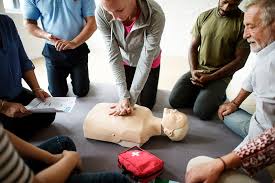Introduction
In our busy globe, emergency situations can strike without warning. Whether it's a minor injury, a clinical emergency, or a dangerous circumstance, understanding how to offer first aid can make all the difference. This is where a First Aid course enters into play. Many individuals might question what they can obtain from such training, and this article aims to shed light on that.
By register in a First Help and mouth-to-mouth resuscitation course, you don't just find out about bandaging injuries or performing CPR; you furnish yourself with indispensable skills that could conserve lives. So, just what will you learn in a detailed course? Allow's study the details.
First Aid Essentials: What You'll Find out in an Extensive Course
Understanding Initial Aid
What is First Aid?
First help refers to the first aid provided to a person struggling with an injury or illness up until expert medical assistance shows up. It encompasses various strategies and skills varying from basic injury like lifesaving techniques like mouth-to-mouth resuscitation (Cardiopulmonary Resuscitation).
Importance of First Aid Training
Why Must You Take a First Aid Course?
Taking a First Aid course is essential for several factors:
- Confidence: Understanding exactly how to react in emergencies can instill confidence. Life-Saving Skills: The ability to do CPR or aid with choking can save lives. Career Innovation: Many occupations call for certification in initial aid. Community Responsibility: Learning means you can assist others effectively.
Overview of CPR
What is CPR?
CPR, or Cardiopulmonary Resuscitation, is an emergency procedure performed when someone's heart beat or breathing has quit. It combines breast compressions with rescue breaths to maintain blood circulation and oxygenation till professional assistance arrives.
The Structure of a Comprehensive First Aid Course
What Does a First Aid Course Include?
An all-around First Aid and mouth-to-mouth resuscitation course usually covers the adhering to topics:

Legal Elements of First Aid
Are There Legal Effects Involved in Providing First Aid?
Yes, offering emergency treatment does carry legal obligations called "Good Samaritan legislations." These regulations shield people that aid others in emergency situations, offered their activities are sensible and not reckless.
Scene Safety and security: The Very First Step
How Do You Guarantee Scene Safety?
Ensuring scene safety includes examining the environment before coming close to the victim:
- Look for prospective risks (web traffic, fire). Make sure it's secure for both you and the victim.
Basic Life Assistance (BLS)
What Role Does BLS Play in Emergency Situation Situations?

Basic Life Support consists of the principles of keeping life features until further clinical assistance arrives. This area covers essential skills such as:
- Checking responsiveness Activating emergency situation solutions Performing high-grade breast compressions
Advanced CPR Techniques
What Are Advanced Techniques Covered in CPR Courses?
Advanced strategies might consist of:
- Two-rescuer CPR Use of barrier devices for rescue breaths Special factors to consider for infants and kids
Choking Relief Techniques
How Do You Aid Someone Who is Choking?
Choking relief includes 2 crucial methods:
The Heimlich maneuver for adults. Back impacts and chest drives for infants.Wound Treatment Management
How Do You Effectively Manage Wounds?
Effective injury monitoring involves:
- Cleaning the injury with saline or tidy water. Applying antibiotic ointment. Covering it with sterile dressings.
Burn Treatment
What Are Effective Techniques for Dealing With Burns?
Burn therapy varies by level:
Cool the melt under running water. Cover it with non-stick dressings. Seek clinical attention for serious cases.Managing Shock
How Is Shock Acknowledged and Treated?
Recognizing shock consists of searching for signs and symptoms like light skin, quick pulse, or confusion:
Lay the individual down. Elevate their legs unless there are injuries protecting against this. Keep them soothe up until assistance arrives.Recognizing Clinical Emergencies
What Kinds of Medical Emergencies Must You Realize Of?
Common medical emergency situations consist of:
- Heart attacks Stroke Severe allergies Comprehending these conditions aids you act quickly.
Using an Automated External Defibrillator (AED)
How Do You Utilize an AED Correctly?
Using an AED includes transforming it on, affixing pads according to pictures on the device, and following voice prompts carefully.
Importance of Continuous Learning
Why Is Constant Knowing Important in First Aid Training?
Continuous understanding guarantees you remain updated on ideal methods and new protocols in emergency treatment care.
FAQs About First Aid Courses
What Is Included in a Standard Emergency Treatment Course?- A standard program typically covers basic life assistance, wound administration, choking relief strategies, and lawful considerations.
- Most courses range from 6 hours to 16 hours depending upon the deepness of material covered.
- Yes, upon successful completion of the majority of programs, participants receive a first help certificate, which is generally valid for two years.
- Yes! Lots of organizations provide on the internet training courses that offer versatile knowing atmospheres while still being effective.
- Absolutely! Hands-on practice is vital for grasping skills like upper body compressions and utilizing AEDs effectively.
- Generally, there are no age constraints; nonetheless, participants must be psychologically qualified to discover these life-saving skills effectively.
Conclusion
Enrolling in a detailed first aid course equips individuals with vital understanding that can conserve lives throughout emergencies-- whether in your home, work, or out in public rooms! From understanding basic life support treatments such as CPR to learning exactly how to handle wounds correctly or acknowledge signs of shock-- these courses give indispensable training that any individual can profit from!
As we browse via our day-to-days live loaded with changability-- what better way than preparing ourselves via expertise acquired from structured training sessions focused on conserving lives?

In verdict-- if you're contemplating using up any type of kind of first-aid training-- never ever hesitate! Equip on your own today with these effective tools due to the fact that preparedness really makes all the difference when every 2nd counts!